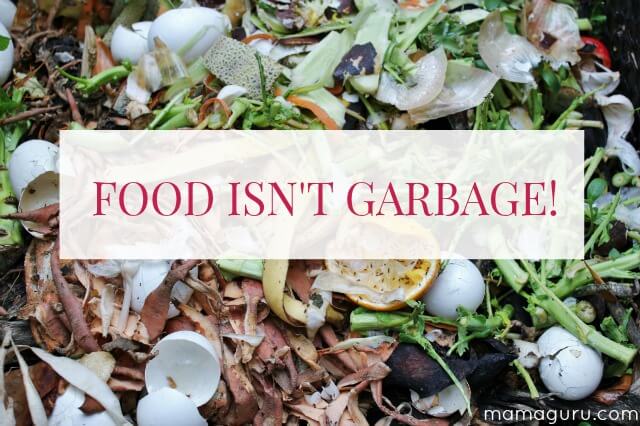Last year leaders from all around the world gathered in London to feast upon destined for the garbage bin. It was perfectly good food that was deemed unfit for Western grocers because of its size and blemishes. There was absolutely nothing wrong with it. Unlike most days, that food wasn’t thrown out to rot in landfills. Instead it was chopped, sauteed, roasted, and elevated by top chefs to demonstrate its intrinsic value.
Of the 4.4 billion tons of food produced each year, roughly half of it is wasted according to the Swedish Institute for Food and Biotechnology. In Africa and Asia, most waste occurs because of improper food storage and transportation. That can be solved as technologies are shared and better infrastructures are built.
In the Western world food waste is primarily due to poor planning and ignorance. The average North American and European wastes 620-660 pounds of food each year. That’s 2,580 pounds of garbage for a family of four every single year.
[clickToTweet tweet=”The average American wastes 620-660 lbs of food each year. That’s 2,580 lbs of garbage for a family of 4 every year! ” quote=”The average North American and European wastes 620-660 pounds of food each year. That’s 2,580 pounds of garbage for a family of four every single year.”]
Think of how many people that could feed.
Think of how much it costs.
All wasted for no reason at all.
This reminds me of the citrus canker disease that wiped out many orange, lemon, lime, and grapefruit trees in Florida. Citrus canker is a bacteria disease that causes blemishes to appear on fruit, although it does not actually effect the quality of fruit. Sunshine State officials chopped down all citrus trees within a 125 radius of every tree they identified as having citrus canker to prevent further spreading of the disease.
Many homeowners lost beloved, uninfected, fruit-producing trees in an effort to save the citrus industry from loss due to blemished, but safe to eat, fruit. The massive hurricanes of 2005 demonstrated the futility of this approach and the eradication program ended, but not before $800,000,000 of federal money was spent needlessly killing 4,000,000 trees.
Why Do We Treat Food Like Garbage?
[clickToTweet tweet=”Why do we treat food like garbage?” quote=”Why do we treat food like garbage?”]
When I read articles about the glories of organic food, there is often a tenor that everything that isn’t organic is flat-out garbage. Studies which demonstrate staggering nutritional losses as food sits are quoted.
Don’t get me wrong, I absolutely support local, sustainable and organic food, but the tone which implies that food is garbage troubles me.
We live in a country with vast food deserts. Food deserts are areas where local people have limited access to quality, fresh produce. Some are located literally in the desert in the Southwest, but others are in the concrete jungles of major cities and, paradoxically, in the great Midwestern farmlands that are increasingly used just for subsidized corn and soybean crops destined for factories. In food deserts, we advise people to go ahead and eat the slightly wilted lettuce, cut out the bruise and eat the rest of the banana.
Why do we call it food for some people, but consider it garbage for our own families?
[clickToTweet tweet=”Why do we call it food for some people, but consider it garbage for our own families?” quote=”Why do we call it food for some people, but consider it garbage for our own families?”]
Feeding our Families Garbage
When I first fed my babies solid food, they would sometimes spit it right back out. Max shuddered so strongly at the taste of his first bite of green beans that he literally hopped three times in his high chair. This is considered normal here in America. We don’t expect children to like green food. There’s a flood of information about how to sneak veggies into our children’s mouths.
But I wonder…
What if we lived in Africa? Do children in countries with limited access to fresh produce reject vegetables outright, or do they eat them, understanding the scarcity and preciousness of fresh food?
[clickToTweet tweet=”Do kids in countries without much fresh produce reject vegetables, or do they eat them, understanding the scaricty? ” quote=”Do children in countries with limited access to fresh produce reject vegetables, or do they eat them, knowing the scarcity and preciousness of fresh food?”]
I don’t know the answer, but I would love to talk to mothers around the world to find out.
What I do know as that in our global community, we are connected not only by our shared humanity and interdependent economies, but also by our food supply. Of earth’s 7 billion current residents, 1 billion are obese and 1 billion are starving. Clearly, we are failing to make that connection.
[clickToTweet tweet=”Of earth’s 7 billion current residents, 1 billion are obese and 1 billion are starving. ” quote=”Of earth’s 7 billion current residents, 1 billion are obese and 1 billion are starving. “]
At the most fundamental level, we need to treat food with the respect it deserves.
It sustains our lives.
It is essential to our survival.
It is certainly not garbage.
[clickToTweet tweet=”Food isn’t GARBAGE!” quote=”Food isn’t GARBAGE!”]







I’m glad this message resonates with you. I’m still curious about how other babies react to food in different countries.
Kate, those all sound like really good tips. I think this is really a case of everybody taking small steps to make a big difference.
You are SO right! I love your post, thank you for writing it. I believe we waste WAY too much food and I just hate it when there are starving people. It just shouldn’t happen, I wish we could share more of it with the hungry.
Wow! This is so eye opening. Thanks for sharing. Important info!
This is so interesting! Definitely something I want to spend more time thinking about. As I start introducing my son to solid foods, I’ve tried to be mindful of letting him explore and appreciate. I’ve also been trying to be more careful about meal planning and buying only what I need, I have been so guilty of throwing out food in the past and that makes me feel so bad. Thanks for putting this out there for us to think about!
You’re absolutely right, food is not garbage. You have a lot of interesting thoughts here, now I’m curious if green foods are “rejected” by infants just like how my baby spits it out. It’s a great reminder to be mentally aware about eliminating my own food garbage in the home!
We can always do better, and I think awareness is really the first step. It’s great that your and your friends are talking about it, Stephanie. Keep the discussion going!
You’re right, Jacki. It’s just plain wrong.
I’m so happy to hear that Kaleigh. Thank you for letting me know. It’s really one of those things where if everyone does a small part, it will have an enormous impact. Spread the word!!
Erin, that’s so great to hear! You are doing your part. Thank you!!!
Abby, we all do that. Hopefully just bringing a little mindfulness to our shopping and cooking habits can reduce much of that waste.
Such a great post. I think about this often. I admit, I am guilty of letting food go bad sometimes. It kills me every time it happens.
Great post! I agree with you. It is sad how food can be tossed for no apparent reason, or go bad quickly due to improper storage. I have been working to improve my standards with food, and not waste so much of it. What is wasted will go straight into compost, but I do my best to keep it from happening.
Such good information here! We take for granted how lucky we are to have food, and we turn around and waste so much. Thank you for enlightening me on something I already knew to be a problem, but ignored. I will definitely do my part to reduce waste in my home!
This was a great post! I HATE wasting food knowing that someone somewhere is going to bed hungry!
I was just talking about this with friends. We’ve been so bad about tossing things out but have made a HUGE effort in consuming what we have instead of throwing it out.
Stephan, Thank you for your insightful comments. It saddens me to see such waste and disregard for food in our world. You have show how this is truly a global problem, but there are simple steps we can all take to reduce our waste.
Hello Mamaguru,
thank you for your great article. I grew up in Germany and have been living in Cape Town South Africa for 20 years now.
I can assure you that most people in this country will gladly eat nearly anything that has any nutritional value to them. I’ve seen little children’s grateful faces for a small plate of food that they received from a helping hand.
Food is not garbage and even food scraps should not end up on landfill sites. A way to help the poor people to grow their own healthy food is by recycling food waste and other organic matter with the help of earthworms.
They can simply grow their own organic fruit and vegetables with the help of earthworms. Worms can recycle any organic waste ranging from food scraps, to tea bags, coffee ground to grass clippings, leaves and many other organic materials and convert them into the richest and most balanced plant foods known to man.
This can be done virtually anywhere even in a plastic bag or an old tin. We have grown the most spectacular and tasty strawberries, spinach, tomatoes, herbs and many other vegetables in very simple set ups that cost virtually nothing.
If everybody would recycle his or her organic waste and grow edible produce with it we could produce enormous amounts of nutritious food on window sills, back yards, roofs, the pavements or even on walls.